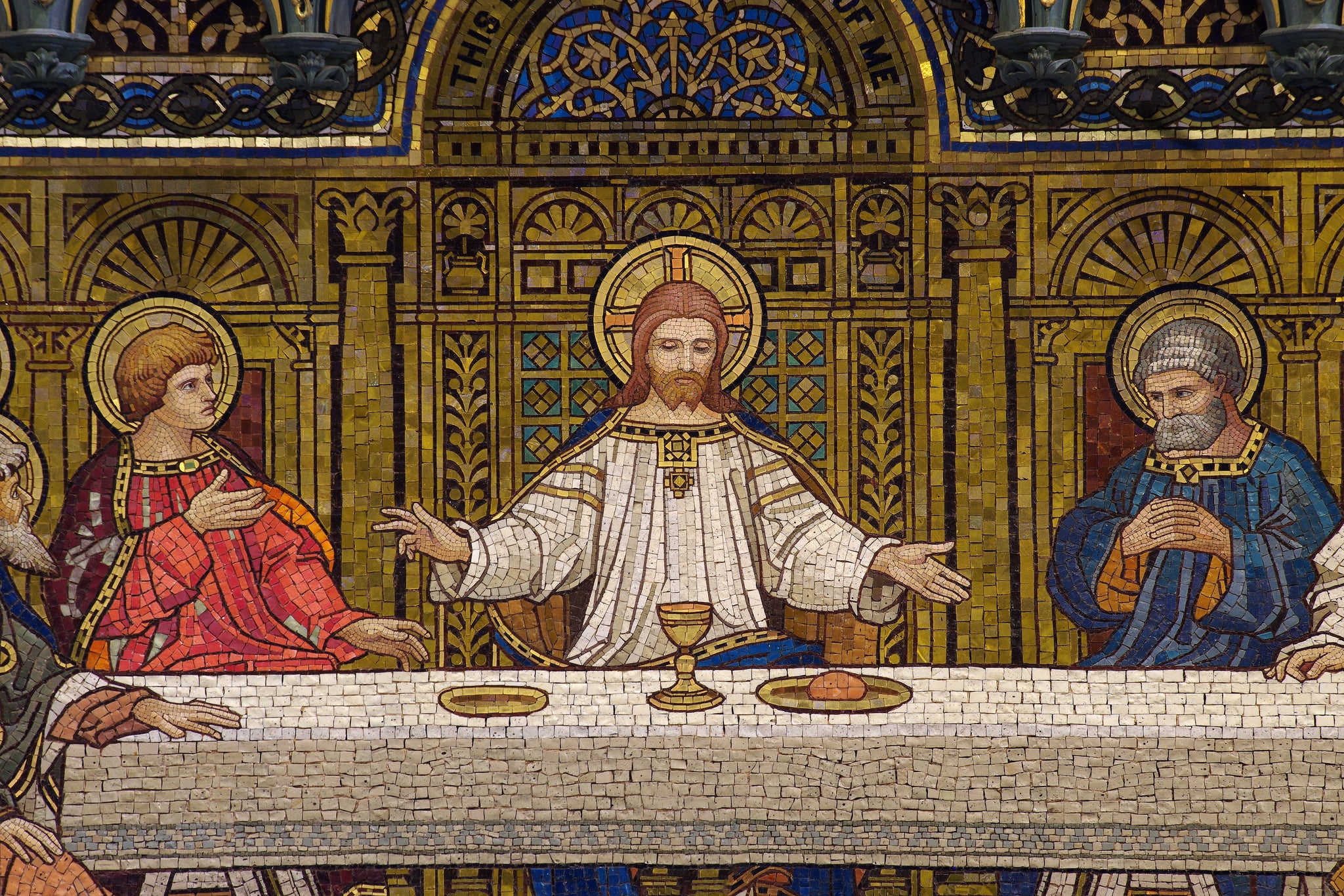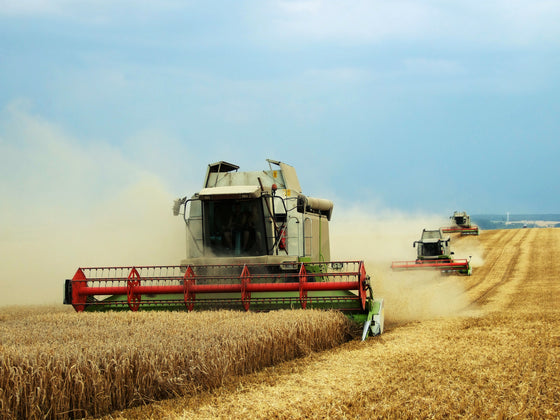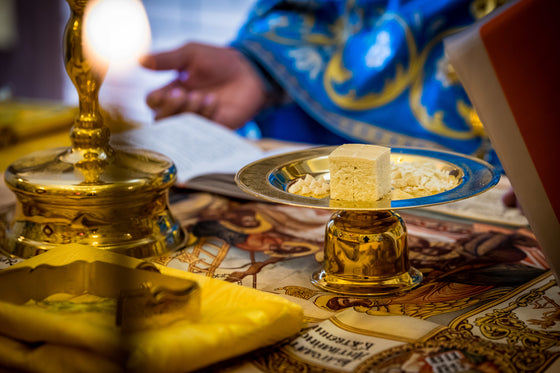Free Shipping on orders over $75 Dollars

In the first two chapters of Genesis, we see God creating the heavens and the earth and placing Adam and Eve in the Garden of Eden.
In the garden, “the Lord God made all kinds of trees grow out of the ground - trees that were pleasing to the eye and good for food. In the middle of the garden were the tree of life and the tree of knowledge of good and evil (Genesis 2:9).”
He told Adam, “You are free to eat from any tree in the garden; but you must not eat from the tree of knowledge of good and evil, for when you eat of it you will surely die.”
We all know what happened next - Adam and Eve ate from the tree of knowledge of good and evil.
For our purposes here, it is worth noting that the Fall of Man occurred because Adam and Eve ate a certain type of food - food that God did not provide.
The First mention we find in the Bible of bread is found in Genesis 3:19.
By the sweat of your face you shall eat Bread. (ESV)
We mostly interpret this verse through a lens which has God storming into the Garden of Eden raging mad that Adam and Eve sinned by eating the forbidden fruit.
But what if we see God as the loving Father that He is speaking to Adam and Eve in Genesis 3?
What if God is laying out for them the means of intermediary reconciliation before the final reconciliation brought about by the death and resurrection of Jesus Christ the Messiah?
This way of understanding the aftermath of the Fall of man was given to me by Marcia Brim in the first episode of her wonderful podcast series on Ancient Faith Radio: The Bible’s Grand Narrative.
She explains that before the Fall, there were only two types of food: food from trees and food from the ground.
Before the fall, Adam and Eve ate food from the trees. You can picture their posture as they are gathering their food — arms up in a posture of thanksgiving and praise.

Then comes the Fall.
After the Fall, God says to Adam and Eve that they are to eat bread. And well… there is no such thing as a bread tree.
The production of bread is time intensive and laborious. You must plant the seed, cut the wheat grass at harvest time (reaping), remove the wheat berries from the head of the wheat (threshing), remove rocks and chaff from the wheat berries (sifting and winnowing), grind the wheat into flour, and then bake the bread!
If you had to grow your own wheat, harvest, grind and bake it, you would likely ask yourself, “why is this process so hard??”
The answer, we are reminded, is that we sinned against God.
“Bread is eaten because of sin. It cannot be produced apart from suffering — suffering depicted by sweat, toil, and thorns.” -Marcia Brim
But this difficulty is not a punishment — it is a gift!
In harvesting wheat, mankind’s posture has changed. We are now bent over in repentance.

By our actions, we separated ourselves from God. And God did not leave us but made a way for us to have a relationship with him — through repentance.
Not only do we learn repentance by the production of bread - we learn trust as well.
God also has a part in the production of bread.
We provide the planting, harvesting, threshing, sifting and baking. But we are dependent on God to provide the seed, the soil, the sun, and the rain - all necessary components of a bountiful harvest.
Ask any farmer and they are likely to tell you, as does this Jewish winemaker, “I pray a lot during harvest.”
In waiting for his provision, we learn to trust Him who sends his rain on the just and unjust, who causes the sun to rise on both the evil and the good (Matthew 5:45).
And whether we deserve it or not, the good and gracious God provides.
Bread is a symbol of God’s love. He made a way for us to continue to have a relationship with him after WE broke the relationship.
Bread is a wonderful paradox. It simultaneously reminds us of our sin and of God’s grace.
We should be cast away but we are brought near. We should be cursed but we are forgiven.
The next place bread shows up in the Bible is Genesis 14 where Abraham is found rescuing his nephew from the kings of Elam and Goiim who had taken Lot captive.
After the rescue, Melchizedek, the king of Salem and priest of the Most High God (Genesis 14:18), brings out bread and wine.
Marcia Brim highlights some interesting points:
“Bread is now paired with wine. It is offered by a priest and a king, a mysterious man, superior to Abraham. Bread and wine are both presented by and given to those who worship the Most High God. This meal brings blessing to both God and man and is served in the context of enemies being defeated by a partnership of humanity and God.”
This is consistent with what we know of Mesopotamian religious practices of this time period. The Babylonians and Assyrians would bring bread and cakes to lay before their gods.
Since God made his pronouncement to Adam and Eve, it makes sense that all of their descendants would understand that bread was a gift of God even when human understanding of God’s character and nature became twisted.
God chose to make himself known to the world through Abraham and his descendants. God continued to walk with this family despite their continual stumbling and moral failures.
The end of Genesis focuses on the story of Abraham’s grandson Jacob and his 12 sons.
Jacob had a favorite son, Joseph. In jealousy, Joseph’s older brothers sold him into slavery to Egypt. Joseph, who incited hatred against himself from his brothers by his ability to interpret dreams (his own), was made viceroy of Egypt for that same ability to interpret dreams (this time Pharaoh’s).
As viceroy of Egypt, Joseph stored grain during the seven years of plenty so that there would be grain during the seven years of famine to follow.
“In Egypt there was bread.”
When Joseph’s family ran out of food, Jacob sent his sons to Egypt to buy bread. Who did they meet but the brother they sold into slavery. Joseph found it in his heart to forgive his brothers by seeing the bigger picture.
"As for you, you meant evil against me, but God meant it for good. In order to bring about this present result - to preserve many people alive."
Marcia astutely notes, “that means of preservation was bread. The result was restoration and fellowship - a fellowship created on the heels of sin.”
God calls Moses to deliver his people out of bondage from the land of Egypt. Through a series of 10 plagues Yahweh showed his dominance over the Egyptian pantheon and secured a release of the Israelites from the hand of Pharaoh.
In the 10th and final plague, the head of each Israelite household was to slaughter a lamb and smear it’s blood over the doorframe of his house so that the angel of death would pass over them and spare their lives.
The lamb was to be eaten along with unleavened bread and bitter herbs in a meal that recalled several things: the bitterness of bondage, the salvation brought about by the blood of a lamb, and the urgency of a hasty departure from a land of plenty.
The ritual of Passover is followed by the Feast of Unleavened Bread which lasts for 7 days.
Prior to the feast, Israelite households search and rid their homes of anything containing yeast, which is symbolic of sin which so easily entangles.
Though not the means of salvation, bread is eaten by those who are being saved who are searching their hearts to rid it of sin.
Only two months after God delivered Israel out of slavery in Egypt through many miraculous wonders and signs, the Israelites begin to grumble against Moses and God for taking them out of Egypt to “starve in the desert.”
Tired and hungry, they long to return to Egypt where they ate their fill of meat and bread.
God doesn’t smite them like you would expect someone in his position to do. Instead he says “I will rain bread from heaven for you, and the people shall go out and gather a day's portion every day that I may test them, whether or not they walk in my instruction."
Marcia points out that just as God used fruit to test Adam and Eve in the garden, he would use bread to test the house of Israel. And like Adam after the Fall, Israel would have to stoop and bow in gathering its bread.
With the provision of this bread (manna) came specific instructions to gather only what they needed for the day except on Friday when they were to gather a double portion. Saturday they were to gather none at all. The Sabbath was to be a day of rest.
God was teaching the Israelites in their gathering, eating, and resting how to live in relation to him: in trust and obedience.
Over and over again, the Israelites proved themselves unfaithful and unwilling to trust God’s goodness.
Still, God remained faithful. Every morning except the Sabbath, the manna appeared. And on Fridays, a double portion.
At Sinai, God establishes his covenant with Israel.
God calls Moses up on the mountain and spends 40 days explaining the Law that the Israelites are to live by. Before the 40 days are up, the Israelites had already committed adultery against the God who rescued them out of Egypt in their worship of the golden calf.
Moses comes down from Sinai and rebukes Israel and Aaron who led them into such great sin. Then Moses pleads with the Lord to not wipe out or abandon the people that He brought out of Egypt. The merciful Lord relents and spends another 40 days with Moses on Sinai sharing his ways with Moses.
When the Israelites were incapable of keeping simple commands like “don’t pick up more than a day’s worth of manna” or “don’t go out to pick up Manna on the Sabbath,” why would God give the Israelites MORE laws to keep??
Here we get to the heart of God’s intentions.
Marcia shows that along with the Law, “Moses was also given the blueprint for the Tabernacle, the priesthood, and the sacrifices - the means by which God's people would know his forgiveness. On Sinai, God wrote down his laws and made provisions for law breakers in the same conversation. The threads of law and mercy are always intertwined as inseparable in God's grand story. These two threads running through the lives of God's people should produce grateful hearts.”
God is remaking the human race. Becoming human is a process of acknowledging our sin, repenting of it, and being grateful to God for his mercy!
Comments will be approved before showing up.

Mankind's greatest temptation has always been to be like God, to be freed from his rule, to be dependent on no one but ourselves. Our first effort to be like God was to eat food that gave knowledge. Our last effort to be like God will be using knowledge to create food. In both cases, man ate food that God did not provide.
